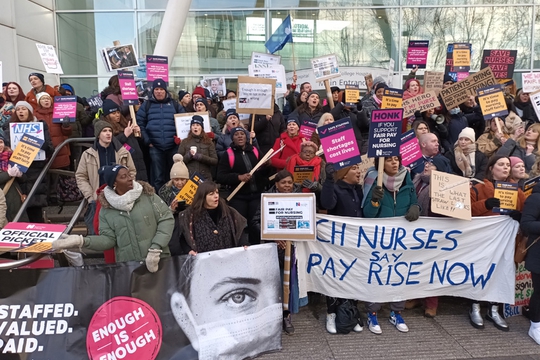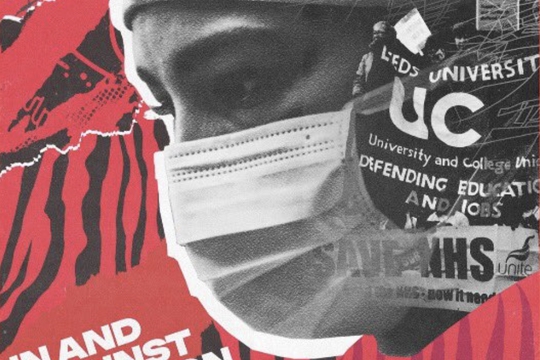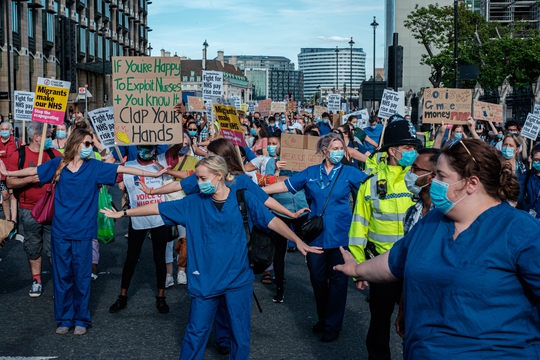Striking as a Nurse: a story from a first-time striker
by
An Anonymous Nurse
April 28, 2023
Featured in In and Against the Union (#17)
Notes from the hospital shop floor

inquiry
Striking as a Nurse: a story from a first-time striker
by
An Anonymous Nurse
/
April 28, 2023
in
In and Against the Union
(#17)
Notes from the hospital shop floor
I work as a nurse in a post-operative care unit. We only have to focus on two patients at a time. When I have to discharge patients from recovery to the wards I feel so guilty taking my patient up. When I get up there, I’m seeing nurses on the verge of breakdown because they can’t accept another post-op patient when there are already fourteen patients to one nurse.
I’m seeing nurses dropping like flies, even just in my department alone. They aren’t moving departments or to other hospitals, they just don’t want to do nursing at all anymore. At the moment, working as a nurse is really heartbreaking.
Fundamentally, it all boils down to the pay. People are not able to live on the nursing wage. The cost of living is too high and the pay is just not sustainable at all. You can actually get paid more working full-time at Waitrose. I know nurses who rely on food banks to survive, that is how bad it has become.
When I trained to be a nurse over thirteen years ago, we received a bursary. It promoted nursing and meant that nurses didn’t come out of training with thousands of pounds of debt. Newly qualified nurses now have to pay off student debt as well as try and survive a cost of living crisis. Who is going to do that?
Patient safety is fundamental, but that is only lacking because we don’t have enough nurses. We don’t have enough nurses because of the low pay. It’s a vicious cycle. I believe 100% that no one goes into nursing for the pay. We go into nursing because we want to make a difference. We are caring people, but you still need to be able to live.
The experience of COVID-19
The ward I’m usually on isn’t intensive, we help people recover from operations. We usually wake them up, give them some opiates and transfer them to another ward.
When the pandemic started, all elective surgeries were cancelled so there was no need for us to do post-operative care. We were given a one day course on ventilators then immediately transferred to the ICU. Nurses in the ICU usually receive a six month course, but we only got this one day. None of us actually felt like we knew what we were doing. We were just told that this is what we had to do and to get on with it.
My son has asthma and had been in the ICU before with a collapsed lung. His GP told me to keep him home from school because he is vulnerable. But I would still be coming home every evening from a COVID-19 ward. I was petrified.
I told the hospital about my son and I showed them letters about his health. I said I didn’t want to bring COVID-19 home with me. They said I could stay in a hotel for 12 weeks but I wouldn’t be able to go home. Honestly, now it is over I can look back and laugh because it seems so ridiculous. At the time, the thought of not seeing my children for 12 weeks, apart from through a window, just couldn’t work for me.
As much as I’m a nurse, I’m a mum first and I had to look after my children. While this was happening I considered just quitting the job altogether. Putting on the PPE for four hour stretches was horrendous but I had to do it. I felt that they needed me, so I put on the whole PPE. One day, the first thing I saw was a really close family friend on a ventilator. I just burst out crying, left the unit, and I never went back in. I told the hospital that if they didn’t redeploy me I was going to have to quit.
Before the strike
In the summer of 2020, there was a Black Lives Matter protest outside my hospital, St Thomas’s. At first, I was a bit nervous to go, it was the first time I had ever taken part in something like that. Our union rep encouraged me, saying “come and just stand on the bridge.” I was standing there, and I’m telling you once I got started I didn’t want to go back to work. We all took the knee and held our hands up. We were screaming and shouting. I absolutely loved it.
After this, I was pretty excited when the strike ballot came around. I’m a member of Unite and RCN (Royal College of Nursing) and I wanted to be involved in more marches, protests, and pickets. I do like to make a lot of noise when I’m out there. I’m always the one with the megaphone cheering on the crowd.
Still though, I didn’t think the RCN strike would actually happen. It’s not that I set out wanting to go on strike. It would have been better if we got the deal we wanted. But, I was happy that I felt like we had a voice for once. We were actually going to do something. As a nurse, you’re supposed to do the job because you care. That means you have to put up with a lot. But I felt empowered and happy we could actually strike.
The strike day
When the strike happened, it was amazing. The anticipation before had been huge. It was touch and go on our unit. I’m a rep and everyone kept asking me questions. No one knew the answers. “Is this allowed? Or that? Are we allowed to strike?” It was really, really confusing. It’s understandable because it’s the first time, well for me at least, that a strike was going to happen.
I work in a post-operative care unit and we didn’t know until just before the strike that we were going to be a derogated unit.1 All elective surgeries had been cancelled but priority theatre would have to keep running. This meant that we had to keep some nurses working for post operative care in emergency cases.
Most nurses were really confused about whether you needed to be in the union to strike, or if the manager could ask you if you were striking or not. I needed to know how to staff the day. But once we got all these issues sorted, we were just really looking forward to the strike day. The majority of nurses were up for it. There were a few that were nervous, but mostly it was nerves about the unknown. When we found out we were a derogated area, some became nervous about taking that decision to strike officially.
On the strike day, I couldn’t wait to go out onto Westminster bridge. I wanted to be outside my hospital and on a picket line. Although I didn’t choose to be an “official picketer” because I needed to be running up and down making noise.
Outside the hospital, it was absolutely freezing. We just kept trying to make noise, the more noise the better. Once we got on the picket line, I don’t think any nurses were nervous or worrying any more. Everyone was really out there enjoying it.
We had a big trolley full of food that everyone was donating to. People, from the public to our patients, were coming out from the wards to put snacks on our trolley. It was so lovely to feel that they were with us, not against us. It really felt like an amazing time of my life, and my career.
I really wasn’t expecting that much public support. You see some comments and read some stuff about how as nurses we should just get on with it. Or other comments that we are putting patients’ lives at risk. That wasn’t what I heard on the day. People were so supportive and I felt like my strike was part of something bigger.
What next?
After the strike, we discussed the prospect of winning while on shift at work. We were really unsure and lacking confidence about winning. The government seemed to be standing strong on this one. However, our discussions have changed. We all agreed that RCN is not going to cave and that we will not let RCN give up.
We didn’t always think that. I’m a member of both Unite and RCN. I joined Unite during the pandemic because they were always up for the fight in my hospital. RCN always gave the impression that they wanted to keep the balance and some sort of equilibrium. We were thinking that they might accept a deal that we’re not happy with. Now that it has gone this far and we’ve taken strike action, I don’t think they will cave. I feel optimistic they will take it as far as it needs to go to get us a better deal.
-
A derogation is an exemption, either of an individual or a whole service, from taking part in strike action. ↩
Featured in In and Against the Union (#17)
author
An Anonymous Nurse
Subscribe to Notes from Below
Subscribe now to Notes from Below, and get our print issues sent to your front door three times a year. For every subscriber, we’re also able to print a load of free copies to hand out in workplaces, neighbourhoods, prisons and picket lines. Can you subscribe now and support us in spreading Marxist ideas in the workplace?
Read next

Welcome to the future: this strike wave is just the start
by
Notes from Below
/
April 28, 2023

